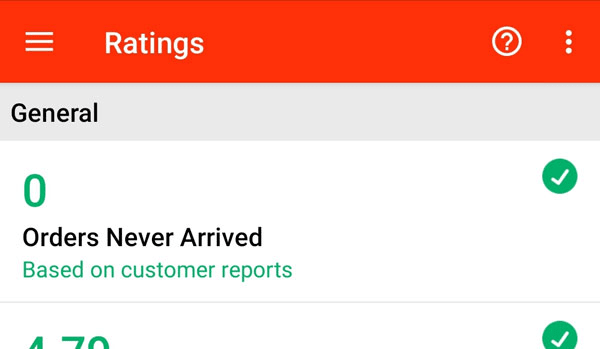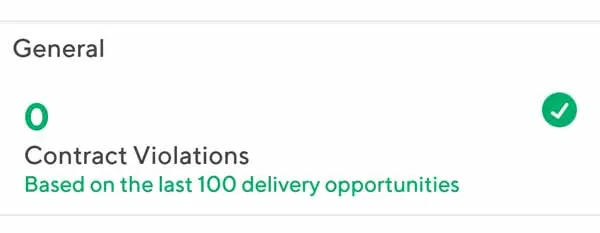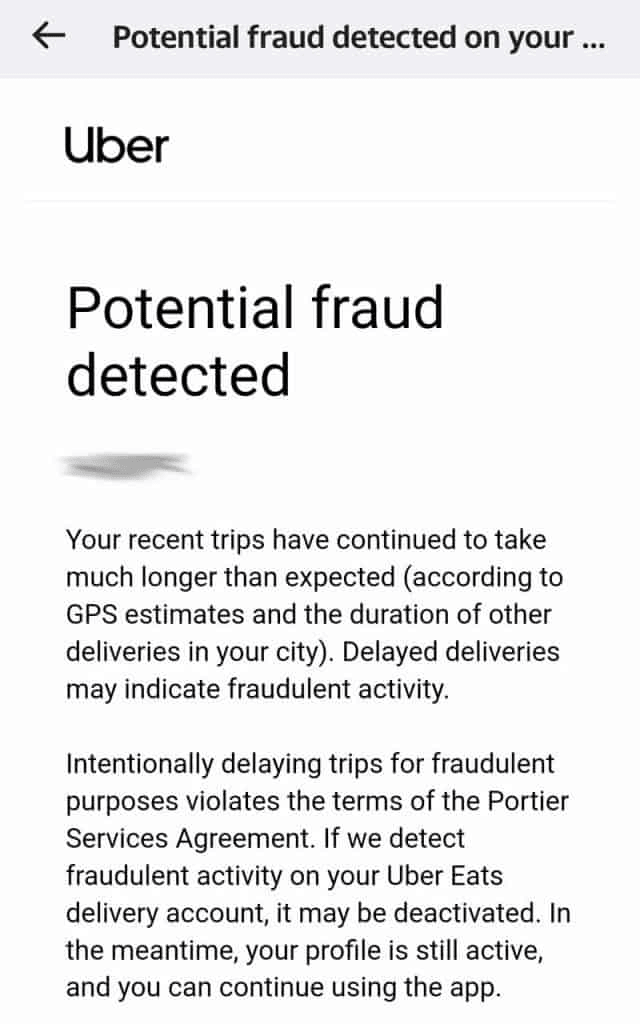What’s going on with all this activation talk lately? What’s up with all this cracking down on contractors lately by Grubhub, Doordash, Uber Eats and maybe others? And how can you avoid being deactivated?
Spend much time lately in Reddit or Facebook groups for drivers and you see people left and right who are being deactivated or threatened with deactivation.
Referral policy fraud.
Extreme lateness.
Fraudulent activity.
What’s going on here?
We’ll get into why this may be happening. Then we’ll talk about whether these companies are crossing the line. Then we’ll get into what we can do to avoid being deactivated. Finally, what do you do when you do get deactivated?

Why is this happening?
I don’t know for sure. But you know me.
I have a theory.
In the height of the shutdown due to the pandemic, all of these delivery companies were just blowing up with new business. The only way a lot of people could eat restaurant food was either pick it up or have it delivered.
Sponsored
Concerned about deactivation? Were you recently deactivated?

Check out Kover.AI (pronounced like Cover).
Kover is an income protection program for gig economy workers. They provide income replacement if you are deactivated.
Kover also works with LegalRideshare to have them write a legal letter on your behalf that requests reqctivation.
First month of membership at Kover is free for the EntreCourier audience.
Uber Eats, Grubhub, Doordash and all the others needed to add a crazy number of new contractors to keep up with the demand.
But what happens when the demand drops off? I’ve certainly noticed a change in demand in the past couple of months.
Things are opening back up a little.
And…. are people running out of money? At the end of July the additional $600 weekly in unemployment that the federal government was giving as part of the CARES act expired. No replacement of that money is in sight.
What do these companies do if they have too many couriers?
That’s a long round about way to get to my theory – I think they’re thinning the herd. And for God only knows what reason, it seems to make sense to just find whatever reason to accuse you of a violation than to find something else.
Is there a crackdown on behavior as well?

Delivery companies continue to struggle with getting orders fulfilled.
They can’t crack down on acceptance rates. It’s illegal for them to require you to accept a certain number or percentage of offers.
But I do think all of them are seeing a trend where people are taking a long time between when they pick up food and when they drop it off.
Are they cracking down on multi-apping?
Maybe. And I say this as an avid multi-apper: Maybe they need to.
Are delivery companies crossing the line with all these deactivations?

I think it’s a number of things.
Some of it is gross incompetence (#cough# #cough# Doordash #cough#).
Some of it is trying to control us a little more.
And I think some of it is probably a legitimate need.
Some of the types of deactivations and terminology related to it.
The thing that I’ve found to be really interesting is how the language has changed.
Companies are throwing around the term “fraudulent activity” and “contract violations.”
This is all about maintaining that independent contractor status. Companies cannot control the work of a contractor. They’re not allowed to punish us for not doing things right.
But they can change the terminology. Extreme lateness now becomes a contract violation. Or they can call it fraudulent activity.
Doordash incompetence and mass deactivations
One of the reasons that I think that all these deactivations are part of companies trying to thin the herd of contractors is a recent thing that seems to have happened with Doordash Dashers.
Suddenly a lot of people were reporting being deactivated for “referral fraud.” These were people who often said they had never even referred anyone, or had only referred a couple of close friends or relatives.
Many soon reported they appealed, were reinstated, and some said they were told there was a glitch.
Another thing happening a lot lately is people who were deactivated due to something that popped up on a background check from several years ago.
That’s the part that has me off on this conspiracy theory… So I’ll put my theory hat on again.

The background check thing is the key to my thinking they’re thinning the herd.
Here’s the thing: Doordash is notorious for doing things on the cheap. That’s why they use independent contractors and outsource all their support over seas. They rely heavily on letting computers do the work so they don’t have to pay people.
It is what it is in the gig economy.
So they have tens of thousands of Dashers and need to thin the herd? You can pay people to do the work. Or you can tell the computer to do it.
Have the computer search the profiles of tens of thousands of Dashers. Look for stuff you can use for deactivation. Tighten the parameters on background checks so things that weren’t an issue before are now.
Unfortunately a lot of people were victims when they set the computers to automatically deactivate people.
Doordash? Computer screwup?
Never.
It’s hard enough when a ticket or accident while on a delivery can get you deactivated. But to have it happen for something that was a long time ago?
This isn’t the first time doordash incompetence led to mass deactivations
In August of last year I wrote about another wave of bogus deactivations.
It was another glitch. That time it involved “multiple accounts.”
Interesting that this happened around the same time of year. Of course there was no pandemic glut, but it makes you wonder if there’s not an annual purge process there.
From “Orders Never Arrived” to “Contract Violations”
This past spring, Doordash added a category to their Driver Ratings screen: “Orders Never Arrived.”

Recently, they changed it to this:

There’s a huge difference in tone with this change, isn’t there?
Orders never arrived kind of leaves the door open that it wasn’t your fault.
“Contract violations” is pretty accusatory.
Calling it a contract violation takes it off their shoulders.
This is a big thing in the whole independent contractor verses employee discussion. If Doordash is controlling your work, that’s a problem. But if they can call it a contract violation, that protects them legally.
Part of why they changed it to this is they can now add other issues. Doordash is starting to crack down on extremely late deliveries.
They can add that to your contract violations.
It’s a paper trail to protect their rear ends. That is, IF Doordash’s data can be relied on.
Folks, I’ve had the same exact on time percentage rating for at least 6 months. Every. Single. Delivery. it has stayed the same. That’s impossible.
Late Deliveries are now Fraudulent Activity.
Grubhub and Uber Eats have been known lately to start sending out warnings over ‘possible fraudulent activity’ related to late deliveries.

The above notice was sent to an Uber Eats courier warning that “delayed deliveries may indicate fraudulent activity.”

A screenshot from an email notifying a Grubhub driver their account was paused for “activyt on your account that is often linked to drivers engaging in fraud”
Here a Grubhub driver’s account was paused. “We noticed activity on your account that is often linked to drivers engaging in fraud, including intentionally delaying the delivery of Grubhub orders that you have accepted.”
issues with the terminology.
How are they to determine that someone was intentionally late? What exactly is intentionally late?
And is it fraud to be late?
I think Uber Eats could make a case. Their algorithm still pays for actual time and mileage on a delivery. It is possible to go out of the way, take more time, and get paid extra because of it.
It would be stupid to do so, in my opinion. You don’t get paid ENOUGH extra to justify the time and mileage expense to do that.
Either way, Uber Eats does have to pay more when that does happen. I am pretty sure people are figuring that out that they can get more, and when that happens, it is fraudulent.
But with Grubhub? You don’t get more. There is no gain, and nothing you get from Grubhub in particular, for getting there later.
The only potential gain here is if you took another delivery on another platform and were late with your Grubhub delivery as a result. The problem though is, that is not prohibited in the contract.
And Grubhub knows they can’t prohibit it.
So there’s a bit of a stretch for Grubhub to call this fraud.
Are delivery apps cracking down on multi-apping? Can they legally crack down with independent contractors?
I’m not sure if I would go so far as to say it’s targeted at people working multiple apps.
But I do think that people working multiple apps are a lot of the problem that they’re cracking down on.
Remember: I’m a proponent of working more than one platform. I believe that there are times that running deliveries from more than one app at the same time is appropriate, as long as doing so does not cause either of those deliveries to be significantly later.
That said, I’m also a strong believer that we make a commitment every time we accept a delviery. We agree to get that delivery done quickly and to get the food to the customer in good condition.
If you take a delivery from another platform that sends you way out of the way to dropping off a delivery you already committed to, you have violated your agreement.
In that sense, it’s appropriate. You agreed to get the food there quickly.
The issue with Grubhub’s dispatching.

I’m picking on Grubhub here because they are the worst at this.
Grubhub will send you to a restaurant long before the food is ready. Time and time again I find that Doordash food is ready. Uber Eats food is ready. Grubhub…. sit back and wait.
You know where it’s worst? Have you noticed this? Grubhub gives a pickup by time. Sometimes they leave that blank – it just says head immediately to the restaurant. Since I started paying attention to that, every time I’ve seen that, the restaurant received the order the exact same time I did.
When you say “head immediately to the restaurant” there’s an implication that the food will be ready. There’s really a contract there just in that.
If I get there and the food’s not ready, Grubhub is the one in violation of the contract here.
In fact I think it’s far more accurate to say GRUBHUB is FRAUDULENTLY dispatching deliveries. They seriously are committing fraud by lying to me about the food being ready.
Update: Grubhub introduced a new violations policy in February 2022.
For the longest time, Grubhub contractors have had their accounts suspended or deactivated due to various behaviors, often stating that they indicated possible fraud. However, until just recently there never was a definition of what those behaviors were.
On February 1, 2022, Grubhub notified contractors of their new contract violations policy. They stated “we’re improving our fraud prevention process,” thus continuing their fraudulent use of fraud terminology.
The interesting thing is that Grubhub listed six “behaviors that are considered violations.” What makes it interesting is that two of these behaviors are not driver behaviors at all. One is a high rate of cancellations BY THE RESTAURANT OR CUSTOMER. The other is a high rate of customer adjustments.
The reality is, these are statistics. Grubhub is managing by algorithm and they are looking for statistics that are indicative of bad behavior by drivers. I wouldn’t mind that so much IF Grubhub were honest about the process and if they provided an opportunity to address the violations if it was an improper violation.
How do you avoid these deactivations?
When Doordash botches their computer program, there’s nothing you can do. It just happens. All you can do is respond and dispute the cause. They’ll give you a link where you can appeal.
When there’s been a glitch at the heart of it, my observation is that people are able to get reinstated pretty quickly.
Otherwise?
Don’t give them any room to accuse you.
Get to the restaurant. Get the food to the customer in good condition.
Do NOT take multiple deliveries that would significantly delay your ability to complete the delivery.
I would go so far as to say if Doordash or Grubhub or Uber Eats stacked you with more than one delivery where it’s horribly inefficient, it might not be a bad idea to cancel out on one of them.
We all get those. The customers are in opposite directions. One order is ready and the other just got started. I’ll either cancel the second delivery, or I’ll go complete the first one and come back for the second if it’s not too far away.
The bottom line is, I won’t accept a second delivery on another platform that really screws up a delivery that I committed to. I’m going to treat deliveries on the same platform the same way.
Verify you’re at the right place when dropping off.
Back in the day before the pandemic, wrong address deliveries were not uncommon. People would use the GPS feature and that feature would get their address wrong. It was often supposed to go next door.
With no contact deliveries, you don’t get the opportunity to find out that you had the wrong address. It wasn’t your fault that you were at the wrong place. But sometimes, the customer isn’t lying, they DIDN’T get the food, but you DID deliver it where they said.
If I have any doubt at all about the address, I’m calling the customer to confirm I’m going to the right place.
Be more selective on the deliveries you accept.
My experience is, the deliveries that seem to get you in trouble more than anything are the ones that pay lower.
If someone’s angling for free food, they won’t usually leave a tip.
If people don’t tip, they tend not to value what you are doing. It doesn’t matter how something affects you. It seems like they are also the most likely to be hyper critical. I just think that a low paying offer is a red flag for something that could be trouble.
Communicate and document.

Is the restaurant slow? Communicate. Is traffic in the way? Communicate. Did you get a double order from the company? Communicate. Are there issues with the instructions the customer gave you? Communicate.
I communicate by text when there’s any issue. It leaves a paper trail.
I’ve had issues where the phone number provided was bad. The number was out of service or whatever. I still send a text saying I tried to call and the number wasn’t working.
Think about it. The number’s bad. I know they won’t get the text.
But I’ll have a record of the text.
Document, document, document.
Have a backup plan
Never rely on only one company.
Never.
Even if you prefer delivering for one, you want to make sure you’re signed up with someone else. Get signed up, do at least enough deliveries for them from time to time to get comfortable with them.
Email me if you’re thinking of signing up for someone else. I can walk you through some options. If I have a referral option that can help you as well, I can let you know.
What do you do if you are deactivated?
You need to respond quickly.
Be professional, be polite. Approach your response from their viewpoint. But respond quickly.
If they identify what the ‘contract violation’ or fraudulent activity was, try to identify what that was about. If you have Google maps, maybe check your timeline for the particular time of the delivery. Do your best to recognize the particular incident.
The hard thing with all these companies is there’s no longer someone you can just go to in order to get it right. The closest thing to that alternative now might be Uber Eats and their Greenlight Hubs.
With Doordash, they’ll give you a link where you can appeal. With Grubhub you can reply to the email. Grubhub has been scaling back the ability to work with a particular driver specialist and instead will have you submit a request form and the next available team member will address it.
If you know what it was that prompted the incident, provide your side of the story. Explain (in a professional manner) what happened and why what you did wasn’t fraud or whatever they accuse you of. Provide documentation if you have it.
There’s a huge problem with how some of them do this. They often don’t tell you what prompted their accusation. It’s just a blanket statement. You must ask them to provide details. By contract they have to. That doesn’t mean they will, but they are required to let you know what is prompting this action.
The example of the Grubhub pause.
Do it nicely. The Grubhub driver that got the notice responded along these lines: I am disputing this because I would never intentionally make an order late. My time is too important and so is my business relationship with Grubhub. Could you please let me know what might have indicated that I was doing this so I can know what to look for?
Interestingly that person was reactivated immediately. The response to his request: “Please be aware that if we receive more reports of negligence and/or unprofessional conduct in the future, it may affect your ability to continue to partner with us.” He replied again asking for details, none were given.
Is there legal recourse?
I want to ask you, if you are listening to this, do you know a lawyer that works in this area?
I would love to interview someone who knows all the legal aspects of this.
Admittedly, I’m hesitant about this. Here’s the thing about lawyers and gig companies. Most of the lawyers that are chasing these companies down are doing so from a misclassification standpoint. They want Grubhub or Doordash or whatever to pay up based on wages they should have paid.
I don’t like going that route. If you know me, you know how I feel about being an employee. I don’t want to push us into that.
I think these companies cross the control line all the time. They’re bullies, and this whole deactivation thing going on right now is another way for them to intimidate contractors into doing things as they want them to be done.
That said, there has to be away to enforce that line between contractor and employee without requiring us to be employees.
So here’s what I want to explore: What can we do legally when the contract is breached? Where can we go when the contract requires them to explain what the issue was but they don’t do it? What do you do when there’s no due process?
Is it arbitration? Is it joining a class action suit? And maybe the misclassification angle is the best one because honestly, that’s the one threat that has beaten these companies back before when it comes to how they cross the line.
All that is to say, I don’t know the legal recourse you could take. I want to find out so I can put it here for anyone who needs it. If someone knows someone who would be a good resource, please let me know.
The bottom line: You’re not an employee.
I think this is the thing a lot of people forget.
They get scared of possible deactivation. So they act like employees.
You have rights. They gave those rights when they inserted the words “independent contractor” into your contract.
One of the rights you have is to make decisions based on how they are doing things. That’s something I’m doing more and more of lately with Grubhub. They want me at the restaurant right away even if the food isn’t ready. That means my minimum price for Grubhub has gone up. It also means I’m just less likely to deliver for them.
There are alternatives.
Do not rely on just one delivery platform.
Make your own business decisions and don’t let these companies bully you into theirs.
How to Avoid Deactivation from Your Contract with Doordash Grubhub Uber Eats

With all of the deactivations happening with gig economy delivery apps, how do you protect against being deactivated for something you didn't do? These seven steps will help you.
Instructions
 Think business/customer, not employee/boss. You're running a business, and this is a contract situation, not an employment one.
Think business/customer, not employee/boss. You're running a business, and this is a contract situation, not an employment one.  Do what you agreed to do. You run a business - be excellent at it.
Do what you agreed to do. You run a business - be excellent at it. Don't do stupid stuff. Use common sense. Don't steal food, don't get in fights with customers and restaurants.
Don't do stupid stuff. Use common sense. Don't steal food, don't get in fights with customers and restaurants. Watch out for traps. Keep an eye out for situations that could get you in trouble (where would a customer lie about not getting their food?)
Watch out for traps. Keep an eye out for situations that could get you in trouble (where would a customer lie about not getting their food?) Document, Document, Document! Get a dashcam! Keep a record of what happens in sketchy situations.
Document, Document, Document! Get a dashcam! Keep a record of what happens in sketchy situations. Evaluate the Customer Relationship. Know when to say when. Does a "customer's always right" approach make sense here?
Evaluate the Customer Relationship. Know when to say when. Does a "customer's always right" approach make sense here? Have a backup plan. Know now what you will do when the unthinkable happens. Get income protection from Kover.
Have a backup plan. Know now what you will do when the unthinkable happens. Get income protection from Kover.
Recommended Products
I get paid for purchases made through affiliate links




novson
Wednesday 14th of October 2020
Everything you stated is wonderful. I faced most of the things you said here. And i strongly agree on the bottom line we are independent contractors so we have to act as we are.